|
|
|
Sort Order |
|
|
|
Items / Page
|
|
|
|
|
|
|
| Srl | Item |
| 1 |
ID:
097924
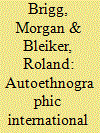

|
|
|
|
|
| Publication |
2010.
|
| Summary/Abstract |
Research is all about a person's engagement with an issue. But most approaches to International Relations actively discourage personal involvement by the researcher. We question the adequacy of this norm and the related scholarly conventions. Instead, we explore how the personal experience of the researcher can be used as a legitimate and potentially important source of insight into politics. But we also note that simply telling the story of the researcher is inadequate. We engage the ensuing dilemmas by discussing how to both appreciate and evaluate autoethnographic insights. Rather than relying on pre-determined criteria, we argue that methodological uses of the self should be judged within knowledge communities and according to their ability to open up new perspectives on political dilemmas. We then advance two related suggestions: one advocates conceptualising research around puzzles; the other explores the methodological implications of recognising that producing knowledge is an inherently relational activity.
|
|
|
|
|
|
|
|
|
|
|
|
|
|
|
|
| 2 |
ID:
097921
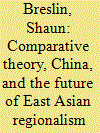

|
|
|
|
|
| Publication |
2010.
|
| Summary/Abstract |
Despite the development of an increasingly sophisticated literature on comparative regional integration drawing from a variety of cases, the European experience remains the most often used benchmark against which other integrative processes are judged; there is still an often implicit expectation that 'successful' processes of regionalism will end up looking something like the European Union. While it is correct to move away from such a 'Euro-dominance', the theoretical lessons learned continue to have salience when applied to emerging and competing forms of integrative processes in East Asia. In particular, when economic considerations dominate regional relations - at times of economic crises - then integrative logics and strategies come to the fore. In more 'normal' times when geo-strategic considerations reassert themselves, then the consensus over region building and the very nature of the region itself is weakened and cooperation is replaced by competing visions and the over-supply of region.
|
|
|
|
|
|
|
|
|
|
|
|
|
|
|
|
| 3 |
ID:
097918
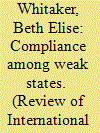

|
|
|
|
|
| Publication |
2010.
|
| Summary/Abstract |
This article examines levels of compliance with the counter-terrorism regime in Africa, where weak states might have been expected to conform. Instead, even under American pressure, some governments have seized the anti-terrorism rhetoric while others have been more reluctant. A comparative analysis of Kenya, Tanzania, and Uganda demonstrates that domestic political factors largely explain this variation; compliance is highest in countries with the least democratic institutions and minimal mobilisation of domestic constituencies. Aid dependence and the perception of a terrorist threat also play a role. To the extent that popular pressures in transitional democracies reduce compliance, the article raises questions about the legitimacy and effectiveness of the counter-terrorism regime.
|
|
|
|
|
|
|
|
|
|
|
|
|
|
|
|
| 4 |
ID:
097914
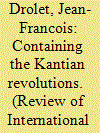

|
|
|
|
|
| Publication |
2010.
|
| Summary/Abstract |
This article examines the neo-conservative critique of global liberal governance. It provides a theoretically oriented assessment of the neo-conservative case against international law and human rights regimes, and draws out the main political and ethical implications for American democracy and American foreign policy. It is argued that the neo-conservative critique of global governance rests upon an interpretation of the normative order that weaves together democracy, individual rights and national autonomy through a volatile identity politics which is fundamentally at odds with both the pluralist character of 'Westphalian diplomacy' and the universal order of rights envisaged by advocates of global governance. More than just the policy autonomy of the US, what is really at stakes in those debates for neo-conservatives is the whole structure of cultural and socio-economic interests that is tied to the substantive interpretation of democracy upon which their domestic commitments to neo-liberal capitalism and liberal freedoms are predicated.
|
|
|
|
|
|
|
|
|
|
|
|
|
|
|
|
| 5 |
ID:
097925


|
|
|
|
|
| Publication |
2010.
|
| Summary/Abstract |
This article queries the place of autoethnography in the study of International Relations as it relates to questions of truth, power, and ethics. The traditional denial of the authorial presence of the self in IR scholarship has been increasingly challenged in recent years, and autoethnography is perhaps the most obvious example of this. This article utilises autoethnography to explore some of the pitfalls and dilemmas associated with the approach - particularly the dangers surrounding 'standpoint' epistemologies, and the need to continue to distinguish between scholarship and storytelling. The article does not dismiss these concerns, but seeks to illustrate the ways in which the discipline is already engaged in storytelling as it narrates its own history and development. At the same time, the article seeks to 'guard against a generation of novelists' whose training would inevitably devolve into a question of crafting the 'prettiest sentence.' Mindful of these concerns, the article nevertheless seeks to demonstrate the ethical value of autoethnography in its exploration of the limitations of academic voice and its impact on those we write, the truths we are able to recognise and transcribe, and the ways in which the academic voice silences the self, who is forced to hide or minimise the often very personal motivations for engaging in IR scholarship. It argues that purposeful autoethnography should have a place among the diverse approaches to IR.
|
|
|
|
|
|
|
|
|
|
|
|
|
|
|
|
| 6 |
ID:
097923
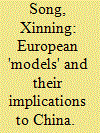

|
|
|
|
|
| Publication |
2010.
|
| Summary/Abstract |
European Studies in China developed very rapidly in the last twenty years. The reasons for that are not only because of the smooth evolution of EU-China relations and wider and deeper economic interdependence between two economic giants, but also the relevance of the European models to China's domestic political and social development, as well as China's external relations. The article reviews the evolution of the European Studies in China and finds out that more and more research on European affairs relates to China's internal and external development. Two major aspects of the learning process are exploited further. Firstly, European models for China's domestic political and social development, including European party politics and Democratic Socialism, European social policy and social security systems, and European regional policies. Secondly, European models for China's foreign policy and external relations, including European neighbourhood policy, European concept of effective multilateralism, Europe as an example of peaceful rise, and functionalism as the way to East Asian regional integration. The EU or Europe has higher profile in China than any other Asia Pacific country. From the domestic political and social development and China's preference in international affairs we can see the silhouette of the European models. Chinese would like to learn more from Europe than the United States. It also shows clearly that the role of the EU as a social power.
|
|
|
|
|
|
|
|
|
|
|
|
|
|
|
|
| 7 |
ID:
097916
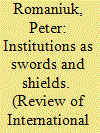

|
|
|
|
|
| Publication |
2010.
|
| Summary/Abstract |
International institutions are prominent in the 'global War on Terror'. But there remains variation in the institutionalisation of counter-terrorism, across policy domains and over time. I argue that institutions pursue tasks of counter-terrorism when they are backed by power. Institutions function as 'swords' as strong states seek to influence others. Weak states, too, are sensitive to the distributional consequences of cooperation and use institutions as 'shields' to resist the powerful. These claims are reflected in patterns of cooperation within the UN, and in terrorist financing and maritime security. Looking forward, multilateral counter-terrorism may remain contingent upon state power.
|
|
|
|
|
|
|
|
|
|
|
|
|
|
|
|
| 8 |
ID:
097922
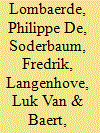

|
|
|
|
|
| Publication |
2010.
|
| Summary/Abstract |
There is virtually no systematic debate on the fundamentals of comparative research in the study of international regionalism. The field of research is very fragmented and there is a lack of interaction between EU studies and regionalism in the rest of the world. There is also a lack of communication between scholars from various theoretical standpoints and research traditions. Related to these two divides is the tension between idiographic and nomothetic methodologies. The purpose of this article is to contribute to the largely neglected debate on how to conduct and address three interrelated problems: a conceptual, a theoretical and a methodological one. Our claim is that the future of comparative regionalism should be one where old divides are bridged. This requires a combination of conceptual rigor, theoretical eclecticism, and sounder empirical research methods.
|
|
|
|
|
|
|
|
|
|
|
|
|
|
|
|
| 9 |
ID:
097920


|
|
|
|
|
| Publication |
2010.
|
| Summary/Abstract |
This article seeks to refine the concept of 'strategic culture' and to highlight some appropriate methods of analysis through which this concept might be applied in empirical studies. In doing so, I seek to synthesise a much ignored element of strategic culture literature - Bradley Klein's 'second generation' approach - with insights drawn from contemporary critical constructivist theory. The resulting conception of strategic culture presents a less deterministic account of culture than that found in much existing literature regarding. It also provides far greater critical potential with regard to the analysis of the strategic practices of states and other actors. More generally, this conception of strategic culture leads us to ask how strategic culture serves to constitute certain strategic behaviour as meaningful but also how strategic behaviour serves to constitute the identity of those actors that engage in such behaviour.
|
|
|
|
|
|
|
|
|
|
|
|
|
|
|
|
| 10 |
ID:
097917
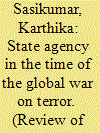

|
|
|
|
|
| Publication |
2010.
|
| Summary/Abstract |
The evolving international counter-terrorism regime obliges and permits countries to make changes in their domestic and foreign policies. At the same time, policy-makers in national capitals respond creatively to the global regime. By examining India's response to the evolving international regime on terrorism, I will demonstrate the mechanism through which the regime is influencing Indian policy: by setting up an identity that the country can aspire to. Further, by highlighting the leveraging of regime norms by the Indian state to further its own projects, I will show that states are not restricted to either passively receiving and complying with international norms on the one hand, or rejecting them on the other.
|
|
|
|
|
|
|
|
|
|
|
|
|
|
|
|
| 11 |
ID:
097919
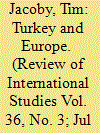

|
|
|
|
|
| Publication |
2010.
|
| Summary/Abstract |
This article argues that current discourses on Turkish corruption are marked by a disproportionate emphasis on culture and can thus be understood as part of a broader relationship with Europe's perennial 'other'. Having traced elements of this within European political elites' response to Turkey's prospective accession to the Union, the article goes on to suggest that the association of corruption with a different cultural orientation represents a useful means of legitimising the extraneous guidance of administrative and economic change. The ultimate aim of such reforms are, the article concludes, to extend the penetrative capacity of European capital, to reduce the transaction costs involved in acquiring Turkish assets and to disable domestic resistance to further marketisation.
|
|
|
|
|
|
|
|
|
|
|
|
|
|
|
|
| 12 |
ID:
097915


|
|
|
|
|
| Publication |
2010.
|
| Summary/Abstract |
This article develops a domestic institutional explanation for the growing institutional diversity in global economic governance. Transgovernmental networks linking domestic regulatory agencies have emerged in a number of areas alongside more conventional cooperation based on international organisations and regimes. At the same time, the number and scope of private self-regulatory schemes at the international level has markedly increased. While rich literatures have developed around each of these three governance cluster, less attention has been paid to the critical questions why, where, and when we are most likely to see one type of governance as opposed to another. The article argues that broad observable patterns of global governance result from specific configurations of domestic institutional variables in leading markets against the backdrop of the dynamics of market globalisation. Empirical evidence from case studies of global governance in the fields of securities, Internet domain names, intellectual property, and hedge funds broadly support the argument.
|
|
|
|
|
|
|
|
|
|
|
|
|
|
|
|
|
|
|
|
|